
National Institute for Basic Biology

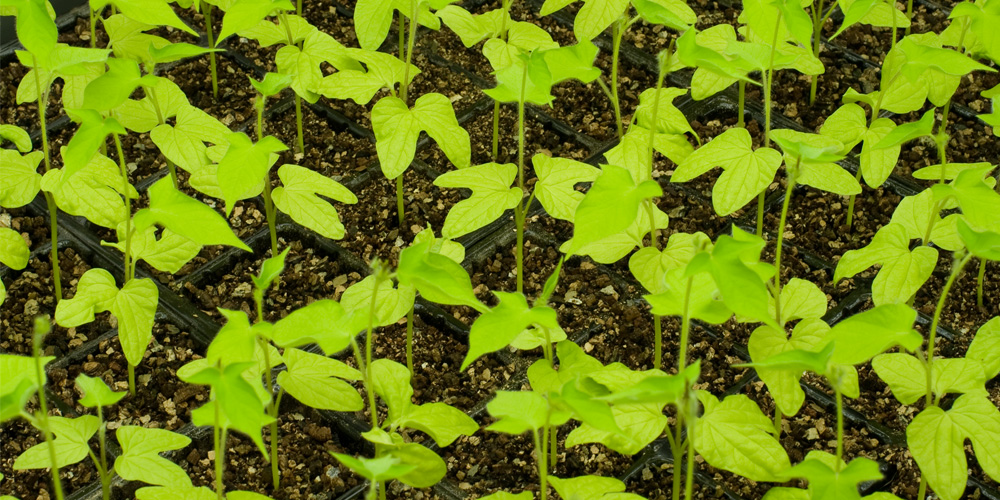


| Organizers | Organizers: Miyo T. Morita (NIBB) Christian Fankhauser (Université de Lausanne, CH) Claus Schwechheimer (Technical University of Munich, DE) Co-Organizer: Kiyoshi Tatematsu (NIBB) |
|---|---|
| Venue | Okazaki Conference Center, Okazaki, Japan |
| Date | July 9 – 12, 2024 |
| Link | Official Website (https://meetings.embo.org/event/24-plant-tropisms) |
| Poster |
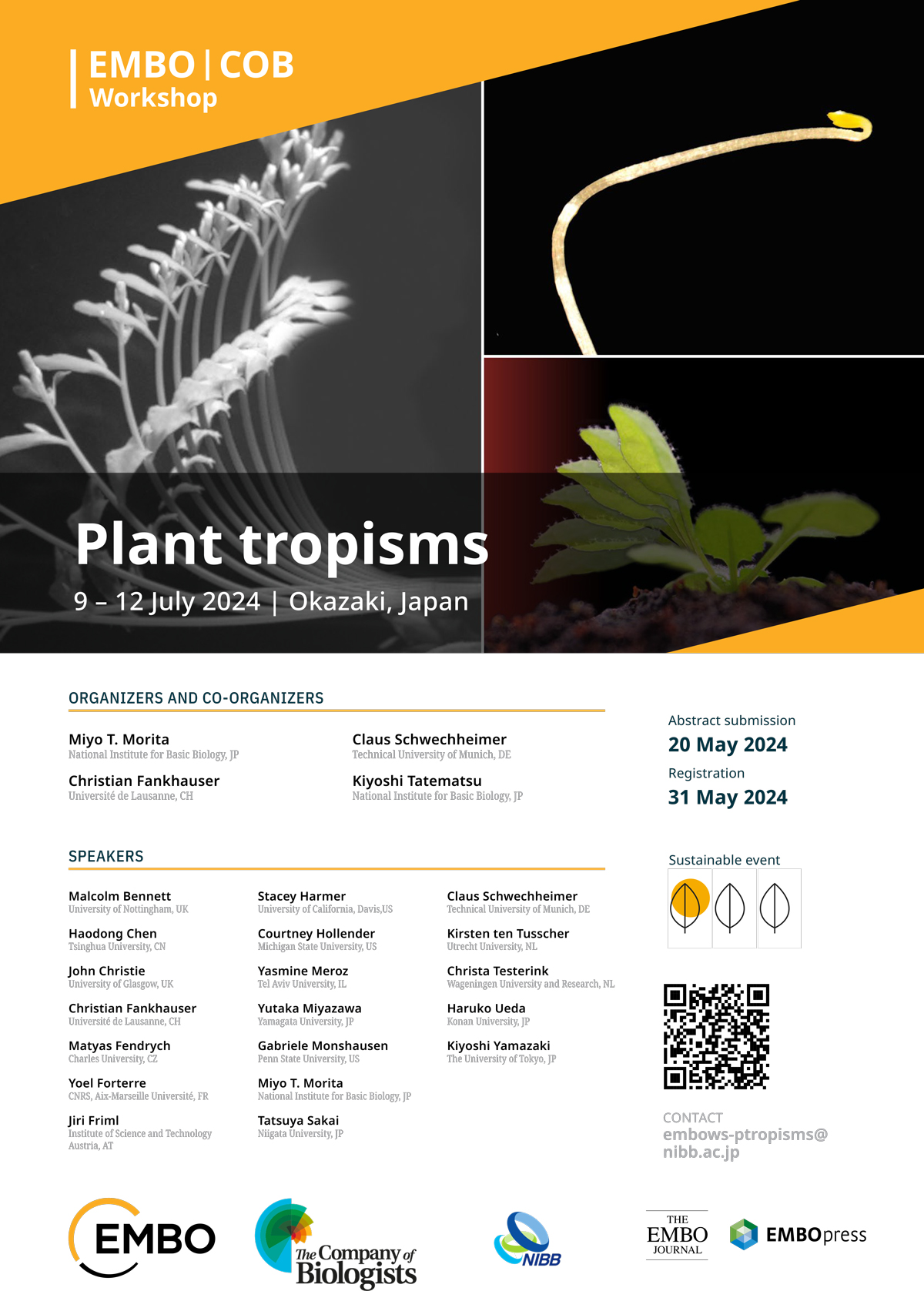
|
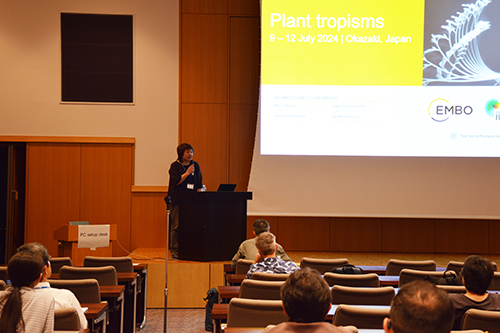
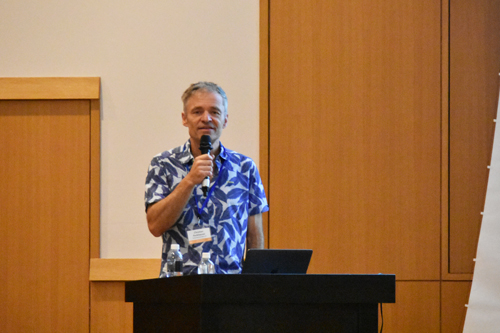
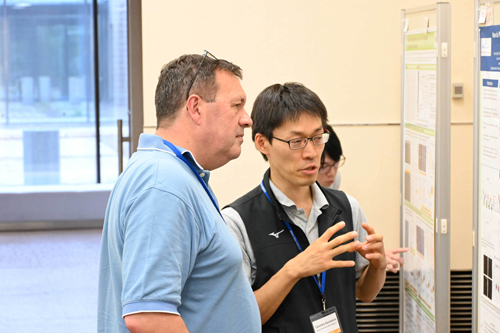
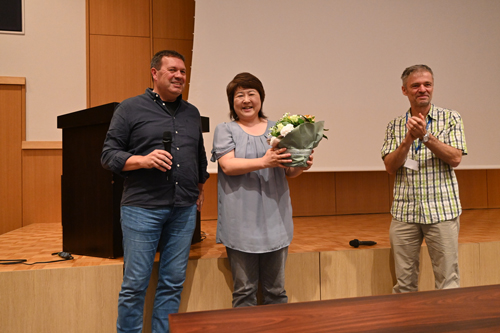
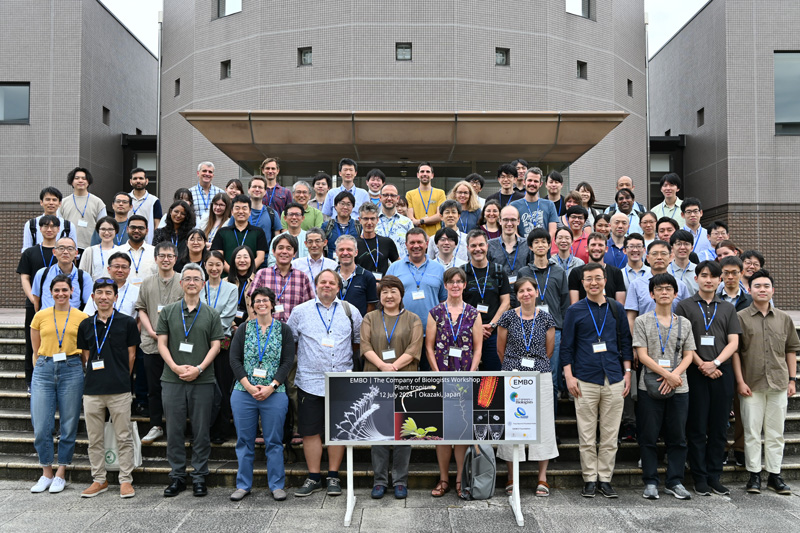
| Day 1 | 9 July 2024 | |
| 13:00 | Registration |
| 13:45-14:00 | Opening Remarks |
| Miyo T. Morita and Kiyokazu Agata (National Institute for Basic Biology, JP) | |
| Session 1 | |
| Chair: Stacey Harmer (University of California, Davis,US) | |
| 14:00-14:30 | Phototropism: from light gradient formation in a photosensitive tissue to regulated asymmetric growth |
| Christian Fankhauser (Université de Lausanne, CH) | |
| 14:30-15:00 | Type 2C protein phosphatases regulate directional light sensing in Arabidopsis |
| John M. Christie (University of Glasgow, UK) | |
| 15:00-15:30 | Functional analysis of intrinsically disordered regions of NONPHOTOTROPIC HYPOCOTYL3 protein |
| Tatsuya Sakai (Niigata University, JP) | |
| 15:30-15:45 | Characterization of blue light-induced paraheliotropic leaf movements in soy bean |
| Shin-ichiro Inoue (Saitama University, JP) | |
| 15:45-16:15 | Coffee break |
| Session 2 | |
| Chair: Wei Xuan (Nanjing Agricultural University, CN) | |
| 16:15-16:45 | How plants respond to salt |
| Christa Testerink (Wageningen University and Research, NL); Online talk | |
| 16:45-17:15 | Deciding where to (g)row; Modeling the tug of war between halotropism and gravitropism |
| Kirsten ten Tusscher (Utrecht University, NL); Online talk | |
| 17:30-19:00 | Mixer with snacks |
| 19:00 | Transfer to City and hotels (free time for dinner) |
| Day 2 | 10 July 2024 | |
| 9:00 | Registration |
| Session 3 | |
| Chair: Hidehiro Fukaki (Kobe University, JP) | |
| 9:00-9:30 | The dynamics of auxin signaling and response during root gravitropism |
| Matyáš Fendrych (Charles University, CZ) | |
| 9:30-9:45 | Exploring the mechanisms of root bending response to gravity through quantitative analysis of cellular dynamics |
| Tatsuaki Goh (Nara Institute of Science and Technology, JP) | |
| 9:45-10:15 | Molecular mechanism of MIZU-KUSSEI1-mediated root hydrotropism in Arabidopsis |
| Yutaka Miyazawa (Yamagata University, JP) | |
| 10:15-10:30 | Auxin biosynthesis, transport and response directly attenuate hydrotropic bending of roots in the latter stages in Arabidopsis thaliana |
| Kotaro Akita (Yamagata University, JP) | |
| 10:30-11:00 | Coffee break |
| Session 4 | |
| Chair: Keiji Nakajima (Nara Institute of Science and Technology, JP) | |
| 11:00-11:30 | Lessons from underground: How do roots sense water availability? |
| Malcolm J. Bennett (University of Nottingham, UK) | |
| 11:30-12:00 | Auxin-triggered rapid cellular responses for gravitropic root bending |
| Jiří Friml (Institute of Science and Technology Austria, AT) | |
| 12:00-13:30 | Group Photo, Lunch with Meet the Speakers |
| Poster session (Odd numbers) | |
| Chair: Kiyoshi Tatematsu (National Institute for Basic Biology, JP) | |
| 13:30-14:00 | Poster Flash Talks |
| 14:00-15:00 | Poster Session |
| 15:00-16:00 | Coffee break (Poster session continued) |
| Session 5 | |
| Chair: Hiromasa Shikata (National Institute for Basic Biology, JP) | |
| 16:00-16:30 | AGC kinases and the power of movement in plants |
| Claus Schwechheimer (Technical University of Munich, DE) | |
| 16:30-16:45 | Systems approaches reveal that ABCB and PIN proteins mediate co-dependent auxin efflux |
| Leah R. Band (University of Nottingham, UK); Online talk | |
| 16:45-17:00 | AI-assisted decoding of condensate assembly in the plant phototropic response |
| Prabha Manishankar (The Center for Plant Molecular Biology (ZMBP), GE); Online talk | |
| 17:00-17:30 | Transport properties of canonical PIN-FORMED proteins and the role of the loop domain in auxin transport and tropisms |
| Ulrich Z. Hammes (Technical University of Munich, GE); Online talk | |
| 17:30-17:45 | Emergence of polar auxin transport regulatory machinery before divergence of land plants |
| Satoshi Naramoto (Hokkaido University, JP) | |
| 17:45-18:00 | Engineering FRET biosensors for direct visualisation of endogenous auxin dynamics |
| Max Josse (University of Cambridge, UK) | |
| 18:00 | Transfer to City and hotels (free time for dinner) |
| Day 3 | 11 July 2024 | |
| 9:00 | Registration |
| Session 6 | |
| Chair: Stefan Kepinski (University of Leeds, UK) | |
| 9:00-9:30 | The physics of gravity sensing by plants: the position sensor hypothesis |
| Yoël Forterre (CNRS, Aix-Marseille Université, FR) | |
| 9:30-10:00 | Gravity sensing and signaling mediated by dynamic polarity shift of LZY |
| Miyo T. Morita (National Institute for Basic Biology, JP) | |
| 10:00-10:15 | Exploring the evolutionary process of plant gravitropism by utilizing the basal land plant, Physcomitrium patens |
| Kanta Suemitsu (Hokkaido University, JP) | |
| 10:15-10:45 | Coffee break |
| Session 7 | |
| Chair: Satoshi Naramoto (Hokkaido University, JP) | |
| 10:45-11:15 | Molecular mechanisms underlying gravity sensing in plants |
| Haodong Chen (Tsinghua University, CN) | |
| 11:15-11:30 | The integration of PIN protein phosphoregulation and LAZY signalling in lateral root gravitropic setpoint angle control |
| Stefan Kepinski (University of Leeds, UK) | |
| 11:30-12:00 | Is that tree weeping or just lazy? A story about pendulous and wandering plum and peach trees. |
| Courtney A. Hollender (Michigan State University, US) | |
| 12:00-12:15 | The molecular mechanism underlying rice root tolerance to ammonium toxicity |
| Wei Xuan (Nanjing Agricultural University, CN) | |
| 12:15-12:30 | The role of polar auxin transport in cell polarity establishment in lateral root primordium formation |
| Sanae Kaneta (Osaka University, JP) | |
| 12:30-13:45 | Lunch with Meet the Speakers |
| Poster session (Even numbers) | |
| Chair: Kiyoshi Tatematsu (National Institute for Basic Biology, JP) | |
| 13:45-14:15 | Poster Flash Talks |
| 14:15-15:15 | Poster Session |
| 15:15-16:15 | Coffee break (Poster session continued) |
| Session 8 | |
| Chair: Yutaka Miyazawa (Yamagata University, JP) | |
| 16:15-16:45 | Actin-dependent organ straightening in establishing plant posture and its mechanical significance |
| Haruko Ueda (Konan University, JP) | |
| 16:45-17:00 | NEK6 provides tissue-specific growth anisotropy through its actin-dependent polar localization in Arabidopsis thaliana |
| Hiroyasu Motose (Okayama University, JP) | |
| 17:00-17:15 | KIPK AGC1 kinases suppress overbending during negative hypocotyl gravitropism |
| Yao Xiao (Guangzhou University, CN); Online talk | |
| 17:15-17:30 | Actin filaments reorganization in response to auto straightening |
| Kinza Khan (University of Clermont Auvergne, FR); Online talk | |
| Group Discussion | |
| Chair: Yasmine Meroz (Tel Aviv University, IL), Matyáš Fendrych (Charles University, CZ), and Haodong Chen (Tsinghua University, CN) | |
| 17:30-18:30 | Standard in tropism research, big challenges, future of the field, interest in follow up conference, publications |
| 19:00-21:00 | Dinner with 1-to-1 discussion (Okazaki New Grand Hotel) |
| Day 4 | 12 July 2024 | |
| 9:00 | Registration |
| Session 9 | |
| Chair: Yoël Forterre (CNRS, Aix-Marseille Université, FR) | |
| 9:00-9:30 | Plant tropisms as a window on plant computational processes |
| Yasmine Meroz (Tel Aviv University, IL) | |
| 9:30-9:45 | Twining plants capitalize on circumnutations to assess mechanical properties of candidate support, and initiate a thigmotropic twining response |
| Amir Ohad (Tel Aviv University, IL) | |
| 9:45-10:00 | Molecular mechanism of apical hook development |
| Pawan K. Jewaria (National Institute of Plant Genome Research Aruna Asaf Ali Marg, IN) | |
| 10:00-10:30 | Recent research progress on the novel root tropism to explore nutrients |
| Kiyoshi Yamazaki (The University of Tokyo, JP) | |
| 10:30-11:00 | Coffee break |
| Session 10 | |
| Chair: Christian Fankhauser (Université de Lausanne, CH) | |
| 11:00-11:30 | Sunflower heliotropism as a model for understanding plant responses to natural environmental cues |
| Stacey Harmer (University of California, Davis,US) | |
| 11:30-11:45 | The clock genes, PRRs, regulate phototropin-mediated blue-light responses in Arabidopsis |
| Gian Carlo F. Maliwat (Nara Institute of Science and Technology, JP) | |
| 11:45-12:00 | Circadian clock regulates root hair elongation in Arabidopsis |
| Akane Kubota (Nara Institute of Science and Technology, JP) | |
| 12:00-12:10 | Closing Remarks |
| Christian Fankhauser (Université de Lausanne, CH) and Claus Schwechheimer (Technical University of Munich, DE) | |
| 12:10-14:00 | Lunch with Meet the Speakers |
| 14:00 | Departure |
| Optional: NIBB Facility Tour (Okazaki Large Spectrograph) | |